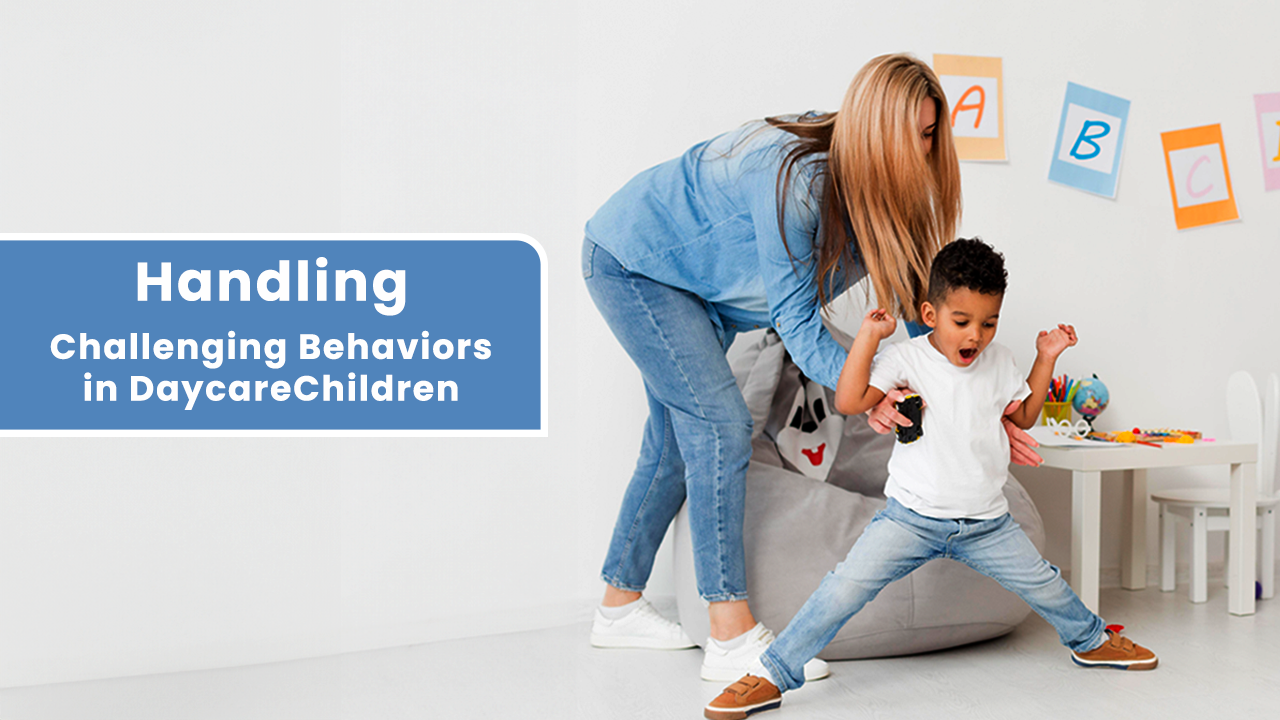
- Understanding Challenging Behaviors In Daycare Children:
- 1- Transition and Change:
- 2- Overstimulation or Understimulation:
- 3- Social Interactions:
- 4- Unmet Needs:
- 5- Language Barriers:
- 6- Emotional Regulation:
- 7- Separation Anxiety:
- 8- Modeling Behavior:
- 9- Physical Discomfort or Illness:
- 10- Attention-Seeking:
- 11- Lack of Boundaries:
- 12- Environmental Factors:
- StrategiesTowards Handling Challenging Behaviors in Daycare Children
- 1- Positive Reinforcement:
- 2- Clear and Consistent Expectations:
- 3- Redirection:
- 4- Modeling Behavior:
- 5- Offer Choices:
- 6- Emotional Support:
- 7- Use Visual Aids:
- 8- Calming Techniques:
- 9- Positive Environment:
- 10- Collaboration with Parents:
- 11- Problem-Solving Conversations:
- 12- Team Approach:
- 13- Documentation:
- How 360Daycare helps daycares with Handling Challenging Behaviors in Daycare Children?
As childcare providers, it is not uncommon to encounter challenging behaviors in daycare children. While most children exhibit positive behavior, some may display problematic behaviors that can disrupt the daycare environment and affect other children. It is essential for caregivers to approach these situations with patience, understanding, and appropriate strategies to promote a positive and nurturing atmosphere for all children involved. This blog post will explore common challenging behaviors and effective techniques to address them while fostering a supportive and constructive environment in daycare settings.
Understanding Challenging Behaviors In Daycare Children:
Children may exhibit challenging behaviors in daycare centers due to various triggers. It’s essential to understand these triggers to provide appropriate support and intervention. Here are some common triggers for challenging behaviors in children at daycare centers:
1- Transition and Change:
Young children can struggle with transitions between activities, such as going from playtime to mealtime or naptime. Changes in routines or the introduction of new activities or staff members can also be challenging for some children.
2- Overstimulation or Understimulation:
Overwhelming sensory experiences or a lack of engaging activities can lead to frustration and acting out.
3- Social Interactions:
Difficulties with social skills, such as sharing, taking turns, or conflict resolution, can result in challenging behaviors when children feel frustrated or misunderstood.
4- Unmet Needs:
Children may display challenging behaviors when they have unmet physical or emotional needs, like hunger, fatigue, or the need for comfort and attention.
5- Language Barriers:
For children who haven’t developed strong verbal communication skills, expressing themselves effectively can be frustrating and lead to behavioral challenges.
6- Emotional Regulation:
Some children may struggle to manage their emotions, leading to outbursts or meltdowns in response to various situations.
7- Separation Anxiety:
Younger children may experience separation anxiety from their primary caregivers, which can manifest as distress and challenging behaviors.
8- Modeling Behavior:
Children often learn from observing others, so witnessing challenging behaviors in peers or adults can influence their own actions.
9- Physical Discomfort or Illness:
A child who is not feeling well or is in pain may show challenging behaviors as a way to communicate their discomfort.
10- Attention-Seeking:
Some children may act out to gain attention from caregivers or peers, especially if they feel ignored or overlooked. Read More on Understanding the Needs of Children in Daycare
11- Lack of Boundaries:
Inconsistent or unclear rules and limits can lead to challenging behaviors as children test the boundaries.
12- Environmental Factors:
The physical environment can impact behavior. Crowded or noisy spaces might overwhelm some children, while others may become restless if there’s insufficient space for movement and exploration.
StrategiesTowards Handling Challenging Behaviors in Daycare Children
Handling challenging behaviors in daycare children requires a thoughtful and proactive approach that promotes positive behavior and addresses the underlying causes of the behavior. Here are some effective strategies to manage and handle challenging behaviors in daycare children:
1- Positive Reinforcement:
Use praise, encouragement, and rewards to reinforce positive behaviors. Recognizing and praising good behavior can motivate children to continue behaving appropriately.
2- Clear and Consistent Expectations:
Set clear and age-appropriate rules and expectations for behavior. Be consistent in enforcing these rules so that children know what is expected of them.
3- Redirection:
When you notice a child engaging in challenging behavior, redirect their attention to a different activity or area. This can help prevent escalation and shift their focus to a more positive action.
4- Modeling Behavior:
Be a positive role model for the children. Display the behavior you want to see in them, such as using polite language and sharing.
5- Offer Choices:
Give children appropriate choices to help them feel empowered and in control of their actions. For example, you can ask, “Would you like to play with blocks or read a book?”
6- Emotional Support:
Help children identify and manage their emotions. Teach them appropriate ways to express feelings like frustration, sadness, or anger.
7- Use Visual Aids:
For younger children or those who struggle with verbal communication, use visual cues and charts to illustrate expected behaviors and routines.
8- Calming Techniques:
Teach children calming techniques like deep breathing or taking a break in a designated quiet area when they are feeling overwhelmed.
9- Positive Environment:
Create a positive and nurturing environment with ample opportunities for play, learning, and social interactions. Ensure the physical space is safe and stimulating.
10- Collaboration with Parents:
Work closely with parents to understand each child’s individual needs and challenges. Share information about behavior and progress, and collaborate on strategies that can be applied consistently both at daycare and at home.
11- Problem-Solving Conversations:
For older children, engage in problem-solving discussions to understand the reasons behind their challenging behaviors and find mutually agreed-upon solutions.
12- Team Approach:
If a child’s challenging behaviors persist, involve a multidisciplinary team, including daycare staff, parents, and professionals like psychologists or therapists, to develop a comprehensive support plan.
13- Documentation:
Keep records of challenging behaviors, their triggers, and the strategies to address them. This documentation can help identify patterns and adjust intervention plans as needed.
Remember that each child is unique; what works for one child may not work for another. Patience, empathy, and understanding are key elements when dealing with challenging behaviors. Daycare staff can help children develop positive behaviors and coping skills by providing a supportive and consistent environment.
How 360Daycare helps daycares with Handling Challenging Behaviors in Daycare Children?
360Daycare management software can be a valuable tool for daycares in handling challenging behaviors in daycare children. The software serves as a supportive aid, complementing the expertise of daycare professionals in understanding, guiding, and nurturing children through challenging behaviors. This is how 360Daycare helps with handling challenging behaviors in daycare children:
- Behavior Tracking and Documentation:
360Daycare management software allows caregivers to track and document challenging behaviors in children. This includes recording the behavior, its triggers, and the response or intervention applied. Having a centralized and organized record helps identify patterns and assess the strategies’ effectiveness.
- Communication with Parents:
Effective communication with parents is crucial when addressing challenging behaviors. Daycare management software often includes features such as messaging and notifications, enabling real-time updates and discussions between caregivers and parents. This fosters a collaborative approach to managing behaviors, as parents can provide valuable insights into their child’s behavior outside of daycare hours.
- Data Analysis and Reporting:
The software’s data analysis capabilities can help identify trends and patterns in challenging behaviors across the daycare. Administrators and educators can use this information to make informed decisions, implement targeted interventions, and improve overall daycare policies and procedures.
- Individualized Care:
Having access to children’s behavior history and personalized strategies through the software allows caregivers to provide individualized care and support to each child, which can be instrumental in addressing challenging behaviors.
It’s important to note that while daycare management software can be a valuable tool, it does not replace the importance of skilled and caring educators and staff.


